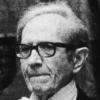Albert Claude

Albert Claude
Albert Claudewas a Belgian medical doctor and cell biologist who shared the Nobel Prize in Physiology or Medicine in 1974 with Christian de Duve and George Emil Palade. His elementary education started in a comprehensive primary school at Longlier, his birthplace. He served in the British Intelligence Service during the First World War, and got imprisoned in concentration camps twice. In recognition of his service, he was granted enrolment at the University of Liège in Belgium to study medicine without...
NationalityBelgian
ProfessionScientist
Date of Birth24 August 1899
CountryBelgium
This attempt to isolate cell constituents might have been a failure if they had been destroyed by the relative brutality of the technique employed. But this did not happen.
Looking back 25 years later, what I may say is that the facts have been far better than the dreams. In the long course of cell life on this earth it remained, for our age for our generation, to receive the full ownership of our inheritance.
I remember vividly my student days, spending hours at the light microscope, turning endlessly the micrometric screw, and gazing at the blurred boundary which concealed the mysterious ground substance where the secret mechanisms of cell life might be found.
Until 1930 or thereabout biologists [using microscopes], in the situation of Astronomers and Astrophysicists, were permitted to see the objects of their interest, but not to touch them; the cell was as distant from us, as the stars and galaxies were from them.
Is it absurd to imagine that our social behavior, from amoeba to man, is also planned and dictated, from stored Information, by the cells? And that the time has come for men to be entrusted with the task, through heroic efforts, of bringing life to other worlds?
It is the cells which create and maintain in us, during the span of our lives, our will to live and survive, to search and experiment, and to struggle.
Man, like other organisms, is so perfectly coordinated that he may easily forget, whether awake or asleep, that he is a colony of cells in action, and that it is the cells which achieve, through him, what he has the illusion of accomplishing himself.
If we examine the accomplishments of man in his most advanced endeavors, in theory and in practice, we find that the cell has done all this long before him, with greater resourcefulness and much greater efficiency.
The cell, over the billions of years of her life, has covered the earth many times with her substance, found ways to control herself and her environment, and insure her survival.
For over two billion years, through the apparent fancy of her endless differentiations and metamorphosis the Cell, as regards its basic physiological mechanisms, has remained one and the same. It is life itself, and our true and distant ancestor.
Small bodies, about half a micron in diameter, and later referred to under the name of 'mitochondria' were detected under the light microscope as early as 1894.
I told him that for a modern scientist, practicing experimental research, the least that could be said, is that we do not know. But I felt that such a negative answer was only part of the truth. I told him that in this universe in which we live, unbounded in space, infinite in stored energy and, who knows, unlimited in time, the adequate and positive answer, according to my belief, is that this universe may, also, possess infinite potentialities.
We know the laws of trial and error, of large numbers and probabilities. We know that these laws are part of the mathematical and mechanical fabric of the universe, and that they are also at play in biological processes. But, in the name of the experimental method and out of our poor knowledge, are we really entitled to claim that everything happens by chance, to the exclusion of all other possibilities?
When I went to the University, the medical school was the only place where one could hope to find the means to study life, its nature, its origins, and its ills.